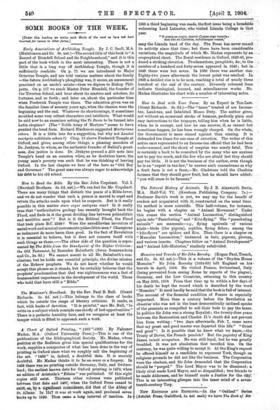How to Read the Bible. By the Rev. John Urquhart.
Vol. I. (Marshall Brothers. 3s. 6d. net.)--ire can feel for Mr. Urquhart. There are many things that disturb the peace of a Bible-lover, and-we do not wonder that such a person is moved to repel and return the attacks made upon what he respects. But is it really possible in this matter stare super antiques Mas? Is it really true that "authoritative geology has recently brought back the Flood, and finds in it the great dividing line between palaeolithic and neolithic man" ? But is it the Biblical Flood, the Flood that took plate B.C. 2349 ? Were the antediluvian inventors of metal.work and musical instruments palaeolithic men ? Champions so indiscreet do more harm than good. In the fact of Revelation it is essential to believe, but it does not concern itself with such things as these.—The other side of the question is repre- sented by, The Bible from the Standpoint of the Higher Criticism : the Old Testament, by Ramsden Balinforth (Swan Sonnenschein and Co., 3s. 6d.) We cannot assent to all Mr. Balmforth's con- clusions, but he holds one essential principle, the divine mission of the. Hebrew prophets. We do not know whether he would accept this phrase as it stands, but he certainly believes that the prophets' proclamation that God was righteousness was a fact of transcendent importance in the development of the world. Those who hold that have still a "Bible."






































 Previous page
Previous page